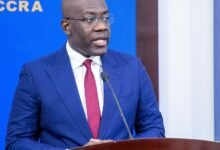Aliko Dangote puts life into the ‘clay feet’ of the giant of Africa

Fifty years ago, Nigeria used to be justifiably mocked as “Africa’s giant with ‘clay feet’.
Justifiably? Yes. Which country in the world would import so much cement that its port facilities could not download them?
Where else could an importer of cement conspire with shipping companies to ship cement to Lagos, to join in a long line of vessels that had formed a “Great Cement Armada” there, knowing the ships could not be unloaded, and that a lot of money could be earned from “demurrage” and insurance charges, as the cement “caked” in the holds of ships’ holds that awaited an unloading that didn’t happen on time?
Huge sums from Nigeria’s earnings from oil were spent to defray such unnecessary expenditures, while millions of Nigerians struggled to survive the inflation that prevailed as a result of the capture of the country’s petroleum resources by local elites and their foreign partners.
As the years rolled along, bad planning, aided by corruption, created a situation whereby Nigeria began to spend huge sums of money importing refined petroleum products. Attempts to alleviate the high cost of imported fuel through a “petroleum subsidy” went awry because – fraudulent accounting in respect of for what had NOT been imported but put on the books as imports, was causing havoc in the economy.
Ameliorating the messy situation regarding local consumption of refined petroleum (by building local refineries) seemed a good idea and refineries were built at Warri and Port Harcourt. But they were operated as state enterprises. Which meant, they were a treasure trove for the bureaucracies that operated them.
Whilst all this was going on, a young man called Aliko Dangote was growing up and getting educated. Born in April 1957, this young man came from a well-known family in Kano — the Dantata family. Business and the Dantatas went together, and the young Aliko must have heard many a story, as he grew up, analysing and decrying what was going on, in the name of “business”, in the country of his birth.
On May 22, 2023, that young man’s idea of helping Nigeria to manufacture what it consumed, and exporting what it did not consume, came to fruition when the “Dangote Petroleum Refinery”, built in the industrial free zone of Lekki, Lagos state, was commissioned by President Muhammad Buhari. The owner of the plant (which cost about $19 billion US to build) showed his intent by also inviting the Presidents of Ghana, Senegal, Togo, Niger and Chad (all of them neighbours of Nigeria) to the opening ceremony.
The presence of Ghana’s President, Nana Addo Dankwa Akufo-Addo, was greatly significant because although Ghana has stepped on the ladder of petroleum and gas production, she has, of late, been experiencing difficulties that remind the populace of the bad old days of “dumsor”. So any amelioration of the petroleum-and-gas supply situation in Nigeria (the new plant will refine 650,000 barrels per day of crude petroleum from Nigeria’s oilfields) is of great importance to Ghana, in terms of making up for shortages that Ghana may experience in utilising her own resources.
Dangote’s mother, Mariya Sanusi Dantata, was the daughter of the wealthy businessman, Sanusi Dantata of Kano. His father, Mohammed Dangote, was a business associate of Sanusi Dantata’s. Through his mother, he is the great-grandson of Alhassan Dantata, who was described as “the richest person in West Africa”, at the time of his death in 1955. The term “richest man” has been bestowed on Aliko Dangote, not just in relation to Nigeria or even to Africa alone, but throughout “the black world”. Both Forbes and other classifiers of people’s wealth agree that he is Black Richman Number One!]
Dangote was educated at, among others, Capital High School in Kano and also at the Government College, Birnin Kudu, from which he passed out in 1978. He next received a bachelor’s degree in business studies and administration from Al-Azhar University in Cairo.
The Dangote Group was established as a small trading firm in 1977. This was the same year Dangote relocated to Lagos to expand the company, trading in commodities, including bagged cement (!) as well as agricultural goods, such as rice and sugar.
He made his big move in the 1990s, when he approached the Central Bank of Nigeria and persuaded its top officials that it would be less expensive for the Bank to allow Dangote’s transport company to manage their fleet of staff buses. This gave him an insight into finance and business, and he hasn’t looked back since. The current Governor of the Central Bank of Nigeria, was one of the guest speakers at the commissioning of the Petroleum Refinery on May 22, 2023. He praised Dangote highly for establishing an enterprise that (he said) “would save Nigeria billions of dollars in foreign exchange.”
BY CAMERON DUODU

